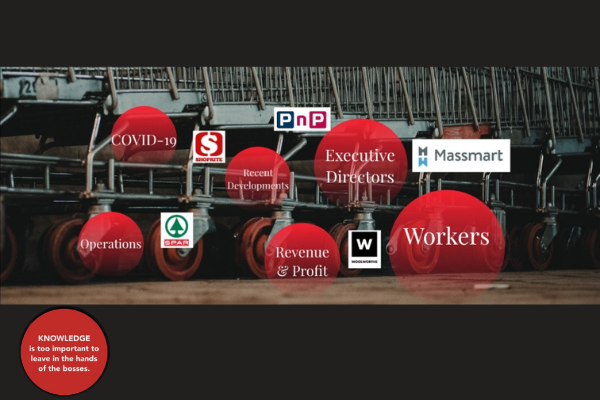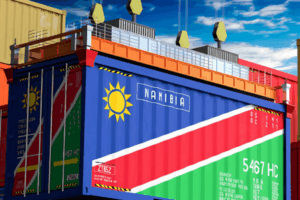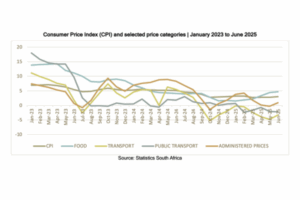Economists are worried about what will happen in South Africa after the lockdown period (now extended to five weeks). Many businesses will have been closed and received no income for five weeks, which means many workers are left without pay. This is not the only thing we should be worried about. It is estimated that one million jobs will be lost, that there will be more social and political tension, that our GDP will shrink by around 7% and that state debt will exceed 80% of GDP in the next two years.
These numbers are intimidating. But what do they mean for the retail sector, and what do they mean for workers? The LRS has taken a look at the five biggest retailers in the country, namely Shoprite, Woolworths, Pick n Pay, Spar and Massmart in order to assess these businesses in light of the current crisis. View Graph 1 and 2 at the footer of this article. The graphs show the five retailers’ revenue and profit before tax over the last four years in the gallery at the footer.
In February, Shoprite cited potential losses in revenue of over R100 million. In light of the company’s revenue in 2019 of over R145 billion, this seems a small loss. However, more than six weeks after this initial announcement, circumstances in South Africa have changed significantly. While Shoprite is mainly a grocery retailer, the parts of its supply chain dependent on international trade and uninterrupted supply chains will be greatly affected. Shoprite has paid its shop floor and distribution staff an ‘appreciation bonus’ adding up to around R102 million. This amounted to a R700 ‘voucher’ to Shoprite. The company is responsible for the livelihoods of over 147,000 employees. Given Shoprite’s role in providing low cost food in Africa, and the dependency of Africans on this, the big retailer will no doubt be able to weather this storm.
Woolworths presents a more complicated problem. Given the company’s bad performance and significant drops in profit over the last two years, the company is not in the best position. Senior Management have pledged to cut their salaries by a third in the next three months to provide additional funds for employees, and has pledged to continue to pay its staff during the lockdown. Ian Moir, CEO of Woolworths, received an annual salary of R18 million in 2019. Should he concede 30% of his salary, this relates to around R450 000 per month. Many have urged other retailers to follow this example. Woolworths depends greatly on its clothing and home revenue, which is halted for the course of the lockdown. The company expects its profits to fall by around 20% in its financial year-end June. The start of the lockdown saw stockpiling (or ‘panic buying’) saw a sharp increase in food sales in March (sales in the four weeks to the end of March increased by 27.6% on the prior comparable period). However, the temporary closure of the other parts of the business saw local sales in the four weeks to the end of March declined by 27.8% compared to the same period last year. Woolworths employs 33,621 people.
Pick n Pay has shown steady growth over the last few years. In 2019, only Spar and Pick and Pay showed increases in profit before tax. The current crisis has forced the retailer to increase its online capabilities: for the ten days leading up to the lockdown, Pick n Pay saw a significant increase in online orders. This prompted Pick n Pay to launch a same-day delivery service, competing with Shoprite’s recent Checkers Sixty60 app launch, which promises to deliver you online order within 60 minutes. The bulk of Pick n Pay’s business remains in groceries and so-called ‘essential goods’, but the clothing and liquor parts of the business will likely take a hit during this time. There have been no public promises of protecting the 52,000 workers through their company-owned stores, not to mention the additional 33,000 workers at franchise stores.
Spar’s business is mostly based on a franchise model. The top management has not made any public moves to protect employees’ income during this time, though the company was one of the first to introduce protective screens in its stores. The company’s revenue has been steadily climbing over the past few year, along with its profit before tax. As Spar is mostly reliant on its food and other essential items sales, there are currently no indicators that the company will suffer big losses during this time.
From the graphs below, we can see the steady decline of Massmart over the last few years. CEO Mitchell Slape closed 34 underperforming DionWired and Masscash stores earlier this year, affecting 1440 jobs. Other parts of the business will suffer. Massmart is not primarily a food retailer. The bulk of Massmart’s profit comes from Masswarehouse (Makro, Fruitspot), which has remained open during the lockdown (for essential items) and Massbuild (Builders’ Warehouse). Masscash (Rhino, Cambridge and Jumbo) was already suffering in the preceding year, and it is doubtful this part of the business will survive the current crisis unless there is urgent intervention. Massdiscounters (Game and Dion Wired) accounted for only around 1.6% of profit in 2019, and what is left of this part of the business will likely suffer greatly. In 2018, Massmart employed 48,500 people.
All these retailers will see some drops in profit: when people have less money, they buy less. The higher LSM buyer may be diverting funds meant for restaurants and other activities to groceries, but the lower LSM will likely suffer most in an economic downturn. The LRS will be keeping a close eye on these retailers, awaiting half-year results to help assess the health of the retailers during the COVID-19 lockdown and the near future.
Not all retailers have risen to the challenge of promising to protect workers. Multinational food retailers Auchan, Carrefour, Casino Group and El Corte Inglés have signed a declaration committing to work with UNI Global Union to protect supermarket workers and customers during the Covid-19 pandemic. None of the big five South African retailers have signed this agreement as of publishing this piece. We urge retailers in South Africa to commit to a joint strategy to protect workers, to protect jobs and to protect customers.







